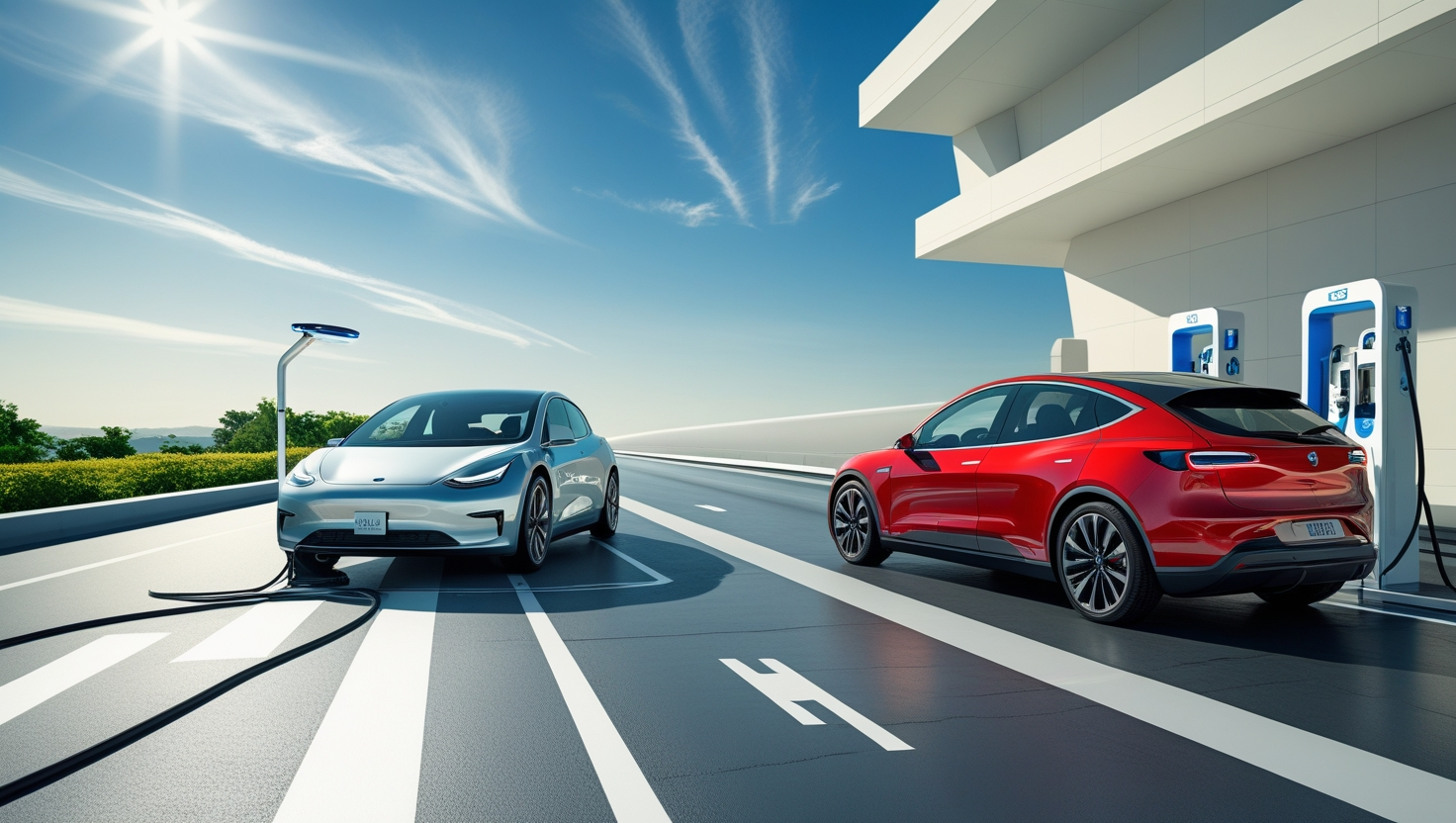Electric Cars vs Petrol Cars - Which Is Better to Buy in 2025?
As the automotive world evolves rapidly, buyers in 2025 face a major decision: electric cars or petrol cars. This guide helps you navigate the pros and cons of each, considering cost, performance, maintenance, environmental impact, resale value, and practicality. Electric vehicles (EVs) are gaining popularity for zero-emission driving, lower running costs, and modern tech features. Petrol cars, however, continue to dominate due to established infrastructure, faster refueling, and longer driving ranges.
This comprehensive comparison evaluates real-world scenarios for Indian buyers, including city commuting, highway travel, and long-distance touring. We cover upfront costs, incentives, battery life, fuel efficiency, maintenance, performance, and lifestyle compatibility. By the end of this blog, you will have a clear understanding of which option aligns with your budget, driving habits, and eco-conscious goals. We also highlight popular electric and petrol models in 2025, helping you make a fully informed purchase decision.
Introduction
The automotive industry is undergoing a transformative shift. Electric vehicles (EVs) are becoming mainstream, backed by government incentives, growing charging networks, and increasing environmental awareness. Petrol cars, however, remain popular due to affordability, convenience, and familiar technology. For potential car buyers in India, deciding between electric and petrol cars in 2025 involves evaluating multiple factors beyond just the purchase price.
1. Cost Comparison: Upfront Price and Running Costs
Upfront Price
Electric Cars: Typically more expensive due to battery costs. Entry-level models start around ₹12–15 lakh in India, while premium models can exceed ₹40 lakh.
Petrol Cars: More affordable; small hatchbacks start at ₹5–7 lakh, sedans ₹8–12 lakh, making them accessible to a larger population.
Running Costs
Electric Cars: Cost per km is lower due to electricity being cheaper than petrol. Maintenance is also cheaper because EVs have fewer moving parts—no oil changes, fewer brake replacements.
Petrol Cars: Petrol prices fluctuate, and engine maintenance can be expensive over time. However, servicing infrastructure is widespread.
Example: Driving 15,000 km/year:
EV cost per km: ₹1.5–2.0
Petrol car cost per km: ₹5–6
2. Performance: Driving Experience and Features
Acceleration & Torque
Electric Cars: Instant torque provides smooth and fast acceleration. EVs like the Tata Nexon EV and MG ZS EV offer city and highway performance with a near-silent drive.
Petrol Cars: Acceleration varies with engine size; turbocharged models can match EVs in short bursts but lack the instant torque feel.
Driving Comfort
EVs are quiet, smooth, and vibration-free, making long commutes more comfortable. Petrol cars have engine noise and vibrations, which may be noticeable during city traffic.
Technology Features
Electric Cars: Most come with advanced infotainment, regenerative braking, and smart connectivity features.
Petrol Cars: Tech features are improving but often cost extra in mid-range models.
3. Refueling vs Charging
Convenience
Petrol Cars: Quick refueling in 5–10 minutes at ubiquitous fuel stations.
Electric Cars: Charging takes longer; fast chargers reduce this to 30–60 minutes, but home overnight charging is common for daily commuting.
Infrastructure
India’s EV charging network is growing but still limited outside metro cities. Petrol stations are well-established across the country.
4. Environmental Impact
Emissions
Electric Cars: Zero tailpipe emissions, lower carbon footprint if electricity comes from renewable sources.
Petrol Cars: Emit CO₂ and pollutants; contributes to urban air pollution.
Sustainability
EV battery production has environmental costs; recycling infrastructure is improving but still a challenge. Petrol cars consume fossil fuels, contributing to long-term environmental impact.
5. Maintenance and Longevity
Electric Cars: Require minimal maintenance—fewer moving parts, no clutch or gearbox wear, brake wear is lower due to regenerative braking. Battery life is 8–10 years; replacement costs are decreasing.
Petrol Cars: Require regular servicing—oil changes, spark plugs, clutch, gearbox, and more frequent brake replacements.
6. Resale Value
Electric Cars: Resale value is improving but still uncertain due to battery degradation concerns. Incentives and increasing EV adoption are positive signs.
Petrol Cars: Established resale market; easier to sell and maintain value over 5–7 years.
7. Popular Models in 2025
Electric Cars
Tata Nexon EV Max
MG ZS EV
Hyundai Kona Electric
Mahindra eXUV400
Petrol Cars
Maruti Suzuki Swift
Hyundai Creta
Honda City
Tata Punch
Example: Tata Nexon EV Max vs Maruti Suzuki Swift for city commuting:
Nexon EV: ₹17 lakh, 312 km range, ₹1.5/km running cost
Swift: ₹7 lakh, 350 km range per tank, ₹5/km running cost
8. Which Car is Better for You?
| Factor | Electric Car | Petrol Car |
|---|---|---|
| Upfront Cost | Higher | Lower |
| Running Cost | Lower | Higher |
| Refueling Time | Longer | Very Quick |
| Maintenance | Low | Moderate-High |
| Environmental Impact | Low | High |
| Resale Value | Growing | Stable |
| Driving Experience | Smooth, instant torque | Familiar, variable |
| Charging Infrastructure | Limited in non-metros | Widespread |
Recommendation:
City Commuters with daily drives ≤ 200 km: EVs are cost-effective and convenient.
Highway/Road Trip Enthusiasts: Petrol cars may still be better until EV charging networks expand.
Eco-conscious buyers: EVs align with green goals, especially with renewable electricity.
Budget-conscious buyers: Petrol cars provide affordability and easy resale.
9. Government Incentives in India
EV buyers may get subsidies under FAME II scheme.
Reduced registration fees, tax benefits, and lower road taxes apply for certain EV models.
Petrol cars have no such incentives, but some states offer reduced road tax for small-engine vehicles.
10. Future Trends
Battery prices are declining, making EVs more affordable.
Charging networks are expanding, including fast chargers on highways.
Petrol car technology is improving with hybrids and mild-hybrid systems to reduce emissions.
India is pushing toward 30% EV adoption by 2030; incentives and infrastructure will further support EV growth.
Conclusion
Electric cars and petrol cars both have strengths and weaknesses in 2025. EVs shine in urban environments, offering lower running costs, reduced emissions, and superior driving comfort. Petrol cars remain practical for longer trips, fast refueling, widespread service availability, and budget-conscious buyers. Your choice depends on your lifestyle, driving habits, environmental priorities, and budget. If city commuting and green impact matter most, an EV is ideal. If highway flexibility and affordability are priorities, a petrol car remains a strong choice. Ultimately, understanding your needs, analyzing running costs, and evaluating infrastructure availability will help you make an informed, future-proof decision.












